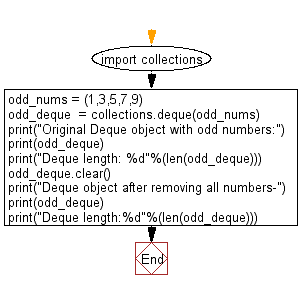Python: Remove all the elements of a given deque object
Python Collections: Exercise-10 with Solution
Write a Python program to remove all the elements of a given deque object.
Sample Solution:
Python Code:
import collections
odd_nums = (1,3,5,7,9)
odd_deque = collections.deque(odd_nums)
print("Original Deque object with odd numbers:")
print(odd_deque)
print("Deque length: %d"%(len(odd_deque)))
odd_deque.clear()
print("Deque object after removing all numbers-")
print(odd_deque)
print("Deque length:%d"%(len(odd_deque)))
Sample Output:
Original Deque object with odd numbers: deque([1, 3, 5, 7, 9]) Deque length: 5 Deque object after removing all numbers- deque([]) Deque length:0
Flowchart:

Visualize Python code execution:
The following tool visualize what the computer is doing step-by-step as it executes the said program:
Python Code Editor:
Have another way to solve this solution? Contribute your code (and comments) through Disqus.
Previous: Write a Python program to add more number of elements to a deque object from an iterable object.
Next: Write a Python program to copy of a deque object and verify the shallow copying process.
What is the difficulty level of this exercise?
Test your Python skills with w3resource's quiz
Python: Tips of the Day
Creates a dictionary with the same keys as the provided dictionary and values generated by running the provided function for each value:
Example:
def tips_map_values(obj, fn):
ret = {}
for key in obj.keys():
ret[key] = fn(obj[key])
return ret
users = {
'Owen': { 'user': 'Owen', 'age': 29 },
'Eddie': { 'user': 'Eddie', 'age': 15 }
}
print(tips_map_values(users, lambda u : u['age'])) # {'Owen': 29, 'Eddie': 15}
Output:
{'Owen': 29, 'Eddie': 15}
- New Content published on w3resource:
- Scala Programming Exercises, Practice, Solution
- Python Itertools exercises
- Python Numpy exercises
- Python GeoPy Package exercises
- Python Pandas exercises
- Python nltk exercises
- Python BeautifulSoup exercises
- Form Template
- Composer - PHP Package Manager
- PHPUnit - PHP Testing
- Laravel - PHP Framework
- Angular - JavaScript Framework
- React - JavaScript Library
- Vue - JavaScript Framework
- Jest - JavaScript Testing Framework
